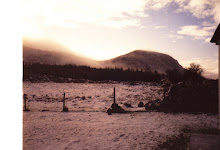
Here's your
Spotify playlist.
Songs 80 to 71, do it:
80: The Twilight Sad - Fourteen Autumns and Fifteen Winters (2007)One thing that really sticks about The Twilight Sad is singer James Graham's Scottish accent. It's so fitting for songs like 'Cold Days from the Birdhouse' and 'And She Would Darken the Memory'. It's also his employment of the c-word whence describing someone wasting away at his desk. The guitars are what make the record, with Graham's simmering hostility finding the perfect foil in the swathes of hammering guitars that push the band ever upward, the rolling, stuttering snare grounded beneath it all.
79: Pan American - White Bird Release (2009)Labradford are a band, like Stars of the Lid, whose style you could describe as 'barely-there', or 'simmercore'. Mark Nelson is Pan American, formerly of Labradford. But Nelson's work as Pan American is more like Stars of the Lid, with more willingly ascending drones and the advent of husky, right-up-close vocals. Listening to this record is like wandering on the edges of sleep, it really feels like sleep-paralysis. Rather than the strange disturbance of being half awake and half asleep, it's fine to drift along these faint lines.
78: Madvillain - Madvillainy (2004)I don't propose to know much about Hip Hop but I like Pete Rock, but he's more straight-up. The combination of Madlib and MF Doom came together in 2004 to make something of a comic book for the ears, or, if you're a bit high brow, a graphic novel for the cochlea. My favourite samples are in the intro track, where Doom introduces Madlib, and a little 1950s
Reefer Madness-esque voice chirrups 'How do you do?' at irregular intervals. The record's sense of humour and thirst for texture is unrelenting.
77: Flying Lotus - Los Angeles (2008)I can't work out Steven Ellison's beats. They suggest the anxiety and paranoia of an artist who works assiduously and on his own. 'Itchy' is the closest you'll get to defining it, but the real joy is in the ambient thrums and fledgling basslines. This is music that is very hard to write about and absolutely brilliant to listen to. You could almost say it was life-affirming. Beautiful, danceable and frightening all in one.
76: Pantha du Prince - This Bliss (2007)It was the Pitchfork review that turned me onto Pantha du Prince, an introduction to the minimal techno field, one that led eventually to Ricardo Villalobos and on to Gas. The thing that hooks me about Pantha du Prince is a resemblance to nature vs. science, technology vs. trees. The medium is all computers, no doubt, but the spirit of the music is vast. 'Saturn Strobe' and 'Asha' make up the first two tracks, and I though they may have come from an overheating laptop in a dark room, the shakers on 'Saturn Strobe' sound like the empty, echoing streets of Berlin.
75: Tinariwen - Aman Imam (2007)Water is Life is the translation, but it could easily be
Music is Life (perhaps for a less poetic European House reincarnation). 'Mano Dayak' and 'Matadjem Yinmixan' are key to the album's melodic core, the chanting doesn't out-do Nusrat Fateh Ali Khan for toil, but the measure of the band's vision is bountiful. It feels almost post-rock in its sense of place, with the unmistakable African guitar sound that reinvigorated a turgid Western scene in the early 00s.
74: Broken Social Scene - Feel Good Lost (2004)Some might describe Kevin Drew and Brendan Canning's work here as a poor man's Pan American or any other Kranky-imprint. But any record with Feist appearing on it is fine with me. It's nice to listen to songs like 'Alive in 85' or 'Guilty Cubicles', to inhale their wistful, almost teenage romanticism and realise the monstrous brilliance that was to arrive in 2002 when Drew and Canning built the BSS ark.
73: Dirty Projectors - Rise Above (2007)I've never listened to Black Flag, but I know their songs are nothing like those that appear courtesy of Dave Longstreth on
Rise Above. That's probably the point. 'Thirsty and Miserable' highlight Longstreth's compositional skill combined with the heavenly vocal harmonies of Amber Coffman and Angel Deradoorian. Some people really don't like Longstreth's voice, but it's a bit like Colin Meloy or Joanna Newsom - though very different - in theory it's a taste worth acquiring.
72: Arcade Fire - Neon Bible (2007)I remember sitting in my university computer room and listening to 'Keep the Car Running' a few weeks before
Neon Bible was released, my hopes were sky-high. I even remember a BBC Newsnight Review episode where the album was reviewed by a group of journos. A TV Chef tore into Win Butler for trying to lecture 'him' about climate change (?) and another novelist called it 'dull'. A Guardian journalist said it was 'scarily good'. It turned out to be a bit of both of the former descriptions. For my money (not much), 'Intervention' is a faux-anthem that underlines Butler's clunky lyricism which is found elsewhere on 'Black Wave/Bad Vibrations'. But not many bands can write songs like 'Keep the Car Running', and as much as it sounds, I actually really like this record.
71: Rufus Wainwright - Want Two (2005)Rufus gets a bad deal
from high-brow motherfuckers, and, if there's one thing Rufus ain't, it's a motherfucker. But that's beside the point. 'Memphis Skyline' is reputedly a song about Jeff Buckley, and it couldn't be more subtle - it neither confirms nor denies it - but Wainwright has admitted as much. The Canadian claims he was jealous of Buckley's successes in the early 90s when Wainwright was floundering in bars and pithy clubs. 'The Art Teacher' is a plaintive love song about a Turner painting and a lost, well, love. Ok, so Rufus's croon may not be for everyone, but, yikes, it works wonderfully for some of us.

